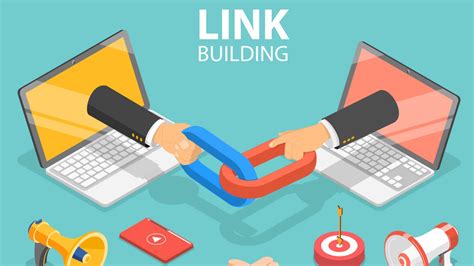Enhancing the online prestige of your website is all about creating valuable connections. Link building strategies pave the way for boosting your website's authority and visibility in search engine rankings, resulting in increased organic traffic. But how can you optimize your link building game without getting lost in the vast sea of information? Here are some expert pointers that will set you on the right path to success.
First and foremost, it is crucial to understand that quality reigns supreme in the realm of link building. Instead of pursuing quantity, focus on generating links from authoritative websites within your niche. A single high-quality backlink can significantly outweigh a multitude of low-quality ones. The key lies in building a network of links that are relevant, credible, and have a strong impact on your website's niche and target audience.
To entice reputable websites to link back to your content, you need to provide value that is too good to ignore. Producing exceptional and engaging content is the cornerstone of any successful link building strategy. From well-researched articles to visually appealing infographics and compelling videos, creativity knows no bounds when it comes to creating link-worthy content. By offering something remarkable and unique, you increase the chances of capturing the attention of high-profile websites and encouraging them to link back.
Another essential aspect is the art of outreach. Building connections within your industry is vital for link building success. Establishing relationships with influencers, industry authorities, and thought leaders opens up a world of opportunities for link collaborations. Be proactive in reaching out to relevant individuals and websites, showcasing your expertise, and expressing genuine interest in collaborating towards mutual growth. Remember, personalized and authentic outreach is much more effective than generic and automated approaches.
Understanding the Significance of Developing Connections

Within the realm of digital marketing, establishing strong connections plays a pivotal role in enhancing online visibility and driving organic traffic to websites. Link building, a fundamental component of an effective digital marketing strategy, revolves around the concept of cultivating meaningful relationships between various online entities. In this section, we explore the crucial importance of link building and its impact on enhancing search engine rankings and improving overall website authority.
Unveiling the Power of Link Building
Link building serves as a conduit that interconnects different websites, directing visitors seamlessly from one platform to another. By building relevant and authoritative links, website owners can contribute to the credibility and trustworthiness of their online domains. Through a comprehensive link building strategy, websites can gain valuable exposure and increase their chances of being indexed and ranked favorably by search engines.
The Role of Link Building in Search Engine Algorithms
Search engine algorithms consider link profiles as a crucial factor in assessing a website's authority and relevance. When external websites link to a specific web page, search engines perceive it as an endorsement and establish a connection between the linked websites. By acquiring quality backlinks, websites can improve their trustworthiness in the eyes of search engines, resulting in higher search engine rankings and increased organic traffic.
Enhancing Website Authority Through Link Building
Building a strong network of authoritative links not only aids in improving search engine rankings but also contributes to elevating the overall authority of a website. As search engines assess the quality and relevance of inbound links, acquiring links from credible sources enhances a website's reputation and positions it as a trusted source of information within its industry. Therefore, implementing an effective link building strategy is vital to establish a strong online presence and gain a competitive edge.
The Benefits of Link Building Beyond Search Rankings
While link building is primarily associated with improving search engine rankings, its benefits extend beyond that. By forging connections with high-quality websites, link building allows for increased referral traffic, positioning a website in front of relevant audiences who are more likely to convert into loyal customers. Moreover, link building fosters partnerships and collaborations, paving the way for mutual growth and brand exposure.
In conclusion, understanding the value of link building is essential in navigating the ever-evolving digital landscape. By recognizing the significance of establishing connections, website owners can leverage link building strategies to propel their online presence, strengthen their authority, and drive sustainable growth.
Identifying High-Quality Websites for Enhancing Your Link Building Efforts
When it comes to expanding your online presence and increasing your website's visibility, building high-quality links plays a crucial role. However, not all websites are created equal, and it is essential to identify reputable and authoritative sources to establish meaningful connections. In this section, we will explore effective strategies for identifying high-quality websites that can enhance your link building efforts.
Evaluating Website Authority: One of the primary factors to consider when identifying high-quality websites is their authority within your industry or niche. Websites with a strong reputation, extensive expertise, and a solid track record are more likely to provide valuable link opportunities. Look for websites that are recognized as thought leaders, frequently cited by reputable sources, and have a substantial online presence.
Assessing Content Quality: Another aspect to consider is the quality of content published on a website. High-quality websites typically offer informative, well-researched, and engaging content that resonates with their target audience. Evaluate the relevance, accuracy, and credibility of the content to ensure it aligns with your brand and provides value to your audience.
Examining Link Profiles: Analyzing a website's link profile is essential in determining its suitability for link building. Look for websites with diverse and natural link profiles, demonstrating a healthy mix of links from various reputable sources. Avoid websites with spammy or low-quality backlinks, as associating your website with such sources can harm your rankings and reputation.
Considering Traffic and Engagement: A website's traffic and engagement metrics can also indicate its quality and potential value for link building. Websites with higher organic traffic, active social media presence, and engaged audiences are more likely to provide visibility and referral traffic benefits through link placements.
Using Online Tools: Numerous online tools are available to assist in identifying high-quality websites for link building. These tools can help you evaluate metrics such as domain authority, traffic, backlink profiles, and content quality. Utilize these tools to streamline your research process and make informed decisions when reaching out for link-building opportunities.
In conclusion, by understanding the key criteria to identify high-quality websites, you can improve the effectiveness of your link building strategies. Focus on authority, content quality, link profiles, traffic, and engagement to establish meaningful connections that benefit your website's visibility and reputation within your industry.
Creating Captivating and Shareable Content

It goes without saying that the success of any link building strategy heavily relies on the quality and appeal of the content being shared. In this section, we will delve into the art of crafting captivating and shareable content that will attract attention and generate interest from your target audience.
| 1. Tell Stories: | Humans are naturally drawn to stories. By incorporating storytelling techniques into your content, you can create a connection with your audience and make your content more relatable and engaging. |
| 2. Evoke Emotions: | Emotional content has a higher chance of being shared. Think about ways to evoke emotions such as joy, surprise, or even awe in your audience. This can be achieved through powerful visuals or thought-provoking narratives. |
| 3. Offer Unique Perspectives: | Standing out in a sea of content requires a fresh perspective. Present unique insights, data, or opinions that haven't been widely discussed before. This will pique the interest of your target audience and encourage them to share your content. |
| 4. Create Visual Appeal: | Visual elements like infographics, images, and videos can enhance the appeal of your content. They not only make it more shareable but also increase the chances of it being linked to by other websites, boosting your link building efforts. |
| 5. Use Compelling Headlines: | A compelling headline is crucial to grab attention. Craft headlines that are concise, intriguing, and relevant to your content. A well-written headline can entice users to click and share your content on various platforms. |
| 6. Provide Practical Value: | Offering practical value in your content makes it more likely to be shared. Whether it's providing useful tips, step-by-step guides, or expert advice, ensure that your content offers tangible benefits to your audience. |
Incorporating these techniques into your content creation process will help you create compelling and shareable content that not only attracts attention but also serves as a valuable asset for your link building endeavors.
Exploring the Potential of Guest Blogging as a Powerful Link Building Strategy
Are you looking for innovative methods to enhance your website's visibility and increase your online presence? One effective approach to consider is leveraging the power of guest blogging as a link building strategy. By strategically collaborating with industry influencers and thought leaders, you can establish valuable partnerships that not only drive traffic to your site but also boost your domain authority.
Guest blogging involves contributing high-quality, informative content to other websites within your niche or industry. This technique allows you to showcase your expertise, reach new audiences, and, most importantly, obtain valuable backlinks. These backlinks act as signals to search engines, indicating that your website is trustworthy and credible.
An essential aspect of successful guest blogging is selecting the right platforms to pitch your content. Identifying reputable websites that have a strong online presence and align with your brand values is crucial. By targeting websites that already attract your target audience, you can ensure that your guest posts resonate with the right people.
- Thoroughly research potential guest blogging opportunities and evaluate their quality and relevance.
- Ensure that the websites have a strong domain authority and a substantial readership.
- Focus on platforms that provide subjects that are closely related to your industry or niche.
- Consider websites that allow guest bloggers to include a brief author bio with a link back to their own website.
Once you have identified suitable platforms, it is crucial to develop well-crafted and engaging content. Your guest posts should provide valuable insights, actionable tips, and unique perspectives that resonate with the target audience. High-quality content not only helps you build relationships with the hosting sites but also encourages readers to visit your own website, boosting traffic and generating leads.
Furthermore, it is important to establish a professional and respectful approach when reaching out to website owners or editors. Personalize your outreach emails, highlighting why you believe your content would be a valuable addition to their platform. Showcase your expertise and provide examples of your previous work to increase your chances of securing guest blogging opportunities.
In conclusion, when utilized strategically, guest blogging can be a powerful link building strategy. By collaborating with influential websites, creating high-quality content, and establishing strong relationships within your industry, you can enhance your online visibility, increase organic traffic, and bolster your website's search engine rankings.
Building Strong Connections for Organic Link Development

In the realm of online promotion, fostering meaningful relationships is an indispensable component of natural link acquisition. By establishing a genuine bond with individuals and organizations within your industry, you can cultivate a network of connections that will lead to valuable, organic backlinks. Gaining high-quality links from trusted sources not only improves the visibility and credibility of your website but also contributes to long-term sustainable growth.
 | Form Strategic Partnerships: Cultivate mutually beneficial collaborations with other websites and businesses that share similar goals or audiences. Collaborative projects, joint promotions, or co-created content can lead to natural link opportunities and expand your reach. |
 | Engage in Guest Blogging: Contribute high-quality content to relevant blogs and publications in your niche. By demonstrating your expertise and providing valuable insights, you can capture the attention of readers and website owners, who may then willingly offer you a link back to your site. |
 | Share Compelling Content: Create exceptional content that resonates with your target audience and provides unique value. By producing informative articles, engaging videos, or interactive infographics, you increase the likelihood of others naturally referencing and linking to your content. |
 | Utilize Influencer Marketing: Identify key influencers within your industry and establish meaningful relationships with them. By leveraging their authority and expertise, you can collaborate on projects, get endorsed, and receive valuable backlinks, reaching a wider audience in the process. |
The foundation of successful link development lies in building genuine connections. Nurture relationships within your industry and community, foster collaborations, and provide valuable contributions. By doing so, you can attract natural links that will not only improve your website's visibility but also establish your brand as a reputable and authoritative source in your field.
Tracking and Assessing the Progress of Your Link Development Endeavors
Efficiently managing and evaluating your endeavors in link development is crucial for the success of your website's visibility and search engine rankings. By monitoring and analyzing your link building efforts, you can gain valuable insights into the effectiveness of your strategies and make necessary adjustments to improve your online presence.
One way to monitor your link building efforts is to generate a comprehensive report that outlines the performance of your acquired backlinks. This report should include metrics such as the number of links, the quality of the linking domains, and the anchor texts used. Analyzing these metrics can help you identify trends and patterns in your link profile, enabling you to focus on areas that require improvement.
Tracking the growth of your website's backlink profile over time is another crucial aspect of monitoring your link building efforts. By regularly assessing the number and quality of incoming links, you can gauge the success of your strategies and identify any anomalies or sudden drops in link acquisition. This information can help you investigate potential issues and take corrective actions promptly.
Furthermore, it is essential to examine the relevancy of the websites linking to your site. A high number of irrelevant or low-quality links can adversely impact your website's search engine rankings. Analyzing the sources of your backlinks allows you to identify potential link sources that may be harming your online visibility and take appropriate measures to remove or disavow them.
| Metrics | Significance |
|---|---|
| Link Quantity | Evaluating the number of acquired links helps measure the overall growth of your link profile. |
| Link Quality | Determining the authority and relevance of linking domains ensures the credibility and trustworthiness of your backlink sources. |
| Anchor Texts | By analyzing the anchor texts used in your backlinks, you can assess the relevance and diversity of your link profile. |
In summary, monitoring and analyzing your link building efforts is integral to the success of your website's visibility and search engine rankings. By tracking the performance, growth, and relevancy of your acquired backlinks, you can make informed decisions and optimize your strategies for better outcomes.
Avoiding Common Errors in Building Successful Links

When it comes to establishing a solid online presence, it is crucial to implement effective strategies for building valuable links. However, there are several common mistakes that many individuals and organizations make which can hinder their link building efforts. This section will highlight some of these errors and provide guidance on how to avoid them. By steering clear of these pitfalls, you can maximize the impact of your link building strategies and increase your online visibility.
1. Poor Quality ContentOne of the most common mistakes in link building is creating low-quality content. High-quality content not only attracts more traffic but also encourages others to link back to your website. Avoid using duplicate or plagiarized content and instead focus on creating unique and valuable content that provides real value to your audience. |
2. Irrelevant or Spammy LinksAnother mistake that many people make is building irrelevant or spammy links. Links should be relevant to the content on your website and should come from reputable sources. Avoid participating in link schemes or purchasing links, as they can have a negative impact on your website's reputation and SEO rankings. Instead, focus on building organic and natural links from authoritative websites within your industry. |
3. Ignoring the Importance of Anchor TextAnchor text plays a crucial role in link building. Using generic or non-descriptive anchor text can make it difficult for search engines to understand the relevance of the linked content. Instead, use descriptive and keyword-rich anchor text that accurately represents the linked page's content. This will not only improve the user experience but also enhance the visibility of your website in search engine results. |
4. Neglecting Outreach and Relationship BuildingBuilding strong relationships and engaging in outreach efforts is essential for effective link building. Neglecting this aspect can limit your opportunities for acquiring high-quality backlinks. Actively engage with influencers, bloggers, and industry leaders through social media, guest blogging, and collaboration opportunities. By nurturing these relationships, you can increase the chances of earning valuable links from reputable sources. |
5. Failing to Monitor and Analyze Link PerformanceLastly, many individuals overlook the importance of monitoring and analyzing the performance of their links. Regularly evaluating link metrics and analyzing data can help identify the effectiveness of your link building strategies. By understanding which links are driving quality traffic and conversions, you can focus your efforts on building similar types of links and adjust your strategy accordingly. |
Continuously Enhancing and Refreshing Your Link Development Approach
Reinforcing the efficiency of your connection establishment technique involves a dynamic and ongoing process of improvement and updating. As search engine algorithms evolve and user preferences shift, it is crucial to constantly evaluate and refine your approach to ensure long-term success.
Staying ahead of the curve: In order to remain competitive in the ever-changing digital landscape, it is essential to continuously enhance your link building strategy. By proactively monitoring industry trends and staying up-to-date on the latest algorithm updates, you can adapt your tactics to maximize effectiveness.
Regularly assessing your current strategy: Take the time to periodically evaluate the performance of your existing link development efforts. Analyze data, such as referral traffic and rankings, to identify areas of improvement and areas that need adjustment. This will help you understand what works and what doesn't, allowing you to make informed decisions moving forward.
Building and nurturing relationships: One core element of an effective link building strategy is the establishment of meaningful relationships with other website owners and influencers in your industry. Continuously reach out to relevant individuals, build connections, and collaborate on mutually beneficial opportunities. Regularly nurturing these relationships can lead to long-term partnerships and an expanded network of high-quality backlinks.
Refreshing content and assets: Keep your website and associated content fresh and engaging. Regularly update existing articles, blog posts, and other resources to ensure they remain relevant and valuable to your target audience. By consistently providing high-quality content, you increase the likelihood of attracting natural links from other websites.
Monitoring and adapting: The digital landscape is dynamic, and your link development strategy should be too. Continuously monitor the performance of your links, track changes in search engine algorithms, and adjust your approach accordingly. Stay informed about emerging tactics and consider incorporating new techniques that align with your goals.
Emphasizing quality over quantity: While it is important to build a diverse and natural backlink profile, focus on acquiring high-quality links from reputable websites. Prioritize relevance, authority, and trustworthiness when pursuing link opportunities. A smaller number of quality links will often yield better results than a large quantity of low-quality links.
Experimenting and learning: Continuously test and experiment with different link building strategies to discover what works best for your specific niche and target audience. Learn from both successes and failures, and adapt your approach based on the insights gained. This ongoing learning process will help you refine and optimize your link building strategy over time.
In summary, continuously enhancing and updating your link building strategy is crucial for long-term success. By staying informed, regularly assessing your efforts, building relationships, refreshing content, monitoring and adapting, emphasizing quality, and experimenting, you can ensure that your approach remains effective and drives sustainable results.
FAQ
What are some effective strategies for link building?
Some effective strategies for link building include creating valuable and shareable content, utilizing guest blogging opportunities, reaching out to influencers and websites in your niche, using social media to promote your content, and participating in industry forums and discussions.
How can creating valuable content help with link building?
Creating valuable content helps with link building because it attracts other websites to link to your content. When your content is informative, engaging, and unique, other websites see value in linking to it, which can improve your website's visibility and authority. Valuable content also encourages social sharing and engagement, which can lead to more backlinks.
What is guest blogging and how does it help with link building?
Guest blogging is when you write and publish an article on another website as a guest author. It helps with link building because you can include a link back to your own website within the content or in your author bio. This allows you to gain backlinks from reputable websites, which can improve your website's search engine rankings and increase your domain authority.
Is it important to target influencers and websites in my niche for link building?
Yes, targeting influencers and websites in your niche is important for link building. When influential websites or individuals in your industry link to your content, it can significantly boost your website's visibility and credibility. By reaching out to them and offering valuable content or collaboration opportunities, you increase the likelihood of them linking back to your website.
How does participating in industry forums and discussions contribute to link building?
Participating in industry forums and discussions allows you to establish yourself as an expert in your field and build relationships with other professionals. By sharing valuable insights and knowledge, you can gain recognition and trust, which often results in other forum members or participants linking back to your website as a reference. This helps to generate high-quality backlinks and improve your website's SEO.
What are some effective link building strategies?
There are various effective link building strategies that can help improve your website's visibility on search engines. Some of these strategies include guest blogging, creating valuable and shareable content, reaching out to influencers for collaborations, and participating in industry forums and communities.
How important is link building for SEO?
Link building plays a crucial role in SEO (Search Engine Optimization). It helps search engines determine the credibility and relevance of your website. High-quality and authoritative backlinks can significantly improve your website's search engine rankings and drive more organic traffic to your site.



